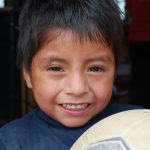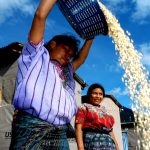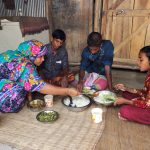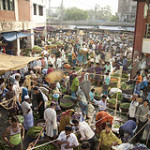IFPRI's work continued to promote improved nutrition in Latin America through innovative evaluations and programs. From 2011 to 2016, IFPRI, in collaboration with Mercy Corps and with support from the United States Agency for International Development (USAID), designed and evaluated the Programa Comunitario Materno Infantil de Diversificación Alimentaria (PROCOMIDA)—a nutrition program aimed at improving the health and >> Read more
Cultivating Effective Nutritional Interventions in Latin America and the Caribbean
One of IFPRI’s earliest nutrition projects in Latin America and the Caribbean examined food-assisted maternal and child health and nutrition programs in Haiti. Traditionally, these programs administered nutritional interventions to children under five years of age only after they became undernourished—the recuperative approach. Although new scientific evidence was surfacing that children under two years of >> Read more
Leveraging Agriculture for Nutrition in South Asia (LANSA)
Agriculture is the primary livelihood for nearly half the population of South Asia, and yet its potential to reduce undernutrition remains unrealized. One-third of children in South Asia are stunted. Despite increasing political will to improve nutrition, evidence has been sparse on how agriculture and agrifood systems can be better designed to improve nutrition. In 2012, a research consortium called Leveraging Agriculture for Nutrition in South Asia (LANSA) was formed among the Collective on Social Science Research in Pakistan, BRAC, the Leverhulme Centre for Integrated Research on Agriculture and Health (LCIRAH), the Institute of Development Studies (IDS), and IFPRI, under the leadership of the M.S. Swaminathan Research Foundation and with support from UK's Department for International Development (DFID). The aim was to generate evidence to strengthen the nutrition sensitivity of agrifood systems in Afghanistan, Bangladesh, India, and Pakistan.
HarvestPlus: Addressing Nutritional Challenges through Zinc Rice
In Bangladesh, 41 percent of children under five are estimated to be zinc deficient according to the Bangladesh Demography Survey, and the country loses over US$700 million in gross domestic product due to vitamin and mineral deficiencies according to the World Bank. Faced with such deficiencies in nutrition and productivity, HarvestPlus, in partnership with the European Commission and the IFPRI-led CGIAR Research Program on Agriculture for Nutrition and Health (A4NH), worked closely with the Bangladesh Rice Research Institute (BRRI), the International Rice Research Institute, and 30 other partners to develop three rice varieties fortified with zinc.
Transforming Nutrition in Bangladesh
MOTIVATION Undernutrition causes the deaths of millions of young children every year. For children who survive, it disrupts their schooling and means they are likely to remain poor as adults. The human and economic costs are enormous. Transform Nutrition is a six-year research program led by IFPRI with support from DFID. The Transform Nutrition consortium, >> Read more
Bangladesh Policy Research and Strategy Support Program
MOTIVATION The Bangladesh Policy Research and Strategy Support Program for Food Security and Agricultural Development, funded by USAID, is the largest project IFPRI has ever had in Bangladesh. Building on previous work in the country alongside government partners in the Ministry of Food and Disaster Management and the Ministry of Agriculture, IFPRI launched the program >> Read more
- 1
- 2
- 3
- …
- 6
- Next Page »




